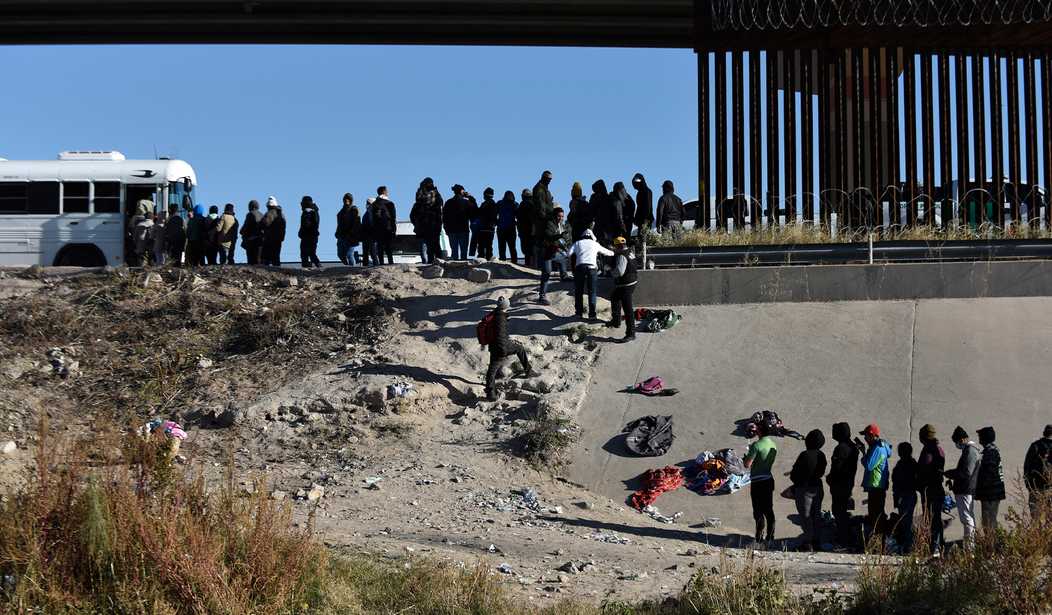A $60 billion aid package for Ukraine won't be passed before the Christmas break, according to Majority Leader Chuck Schumer. Republicans are refusing to support the aid bill without "transformative" changes to immigration and border security laws.
Hope for a last-minute deal fell through and many Senators have already gone home for the holidays. When they get back, they'll not only have to address the aid for Ukraine, Israel, and Taiwan but also the $14 billion for increased border security.
That's a separate issue from altering the asylum procedures to make it harder for migrants to claim asylum status. Senators have been negotiating a tightening of asylum eligibility, increasing migrant detentions and deportations, and establishing new authority to turn away asylum-seekers at the border.
This is the absolute minimum House Republicans might accept and many may not even take the deal. But it's not likely that Republicans will get a better deal on asylum in this Congress or any other.
Immigration is also being discussed and a border measure that would work like Title 42, the pandemic-era deportation rule, is a real possibility.
Helping the Democrats get to "yes" on these restrictions is the massive influx of illegal aliens in the past three months. Monday saw the largest single-day number of encounters ever at the border with more than 12,600 migrants overwhelming border patrol in Texas, Arizona, and California.
Related: U.S. Closes Several Border Crossings to Contain Unprecedented Migrant Surge
But some Democrats are resisting the changes. In fact, some Democrats are still refusing to acknowledge there's a crisis.
"We finally have everybody at the table and everyone admitting that this is a national security crisis that we do have to address. That's actually progress. That may seem shocking to a lot of viewers, but that's taken a long time to be able to get to this point," Sen. James Lankford (R-Okla.) said Tuesday morning on Fox News' "America's Newsroom."
"We're just literally trying to be able to say to Democrats, ‘Listen, this has to be solved,’" Lankford said. "You don't want to solve it. We're going to actually push to get this solved. It'll be politically beneficial for Democrats to get this solved, to take this issue off the table."
Sen. Majority Leader Chuck Schumer, D-N.Y., said Tuesday morning that senators "must succeed" on border and Ukraine talks, after the White House claimed that Ukraine would run out of U.S. aid on Dec. 30.
The White House warned this week that an aid package scheduled for Ukraine later this month will be the country’s last this year without a deal from Congress, even after Ukrainian President Volodymyr Zelensky met with congressional leaders last week in an effort to make his case directly to lawmakers.
Biden has said he is open to compromise with Republicans on border security, risking a move that could upset progressives he needs to turn out for him in next year’s election.
Republicans not only have to find a way to deal with the current border crisis, but equally as important, they must figure out a way to deter the massive numbers of people sneaking over the border in record numbers. Stronger enforcement of border laws, including erecting a wall, is only part of the solution. There has to be a way to disincentivize people from trying to enter the United States.
Start denying asylum requests in bunches and people will think twice about crossing the border. In the short term, that might work to slow the movement of people to the United States. But what's needed is a fundamental shift in U.S. policy.
Center for Immigration Studies:
The challenge in implementing this principle, from the White House’s perspective, is that any deterrence “stymies legitimate asylum seekers”. Consequently, deterring foreign nationals from entering illegally had to be ditched as an administration policy, and if you take a look at the latest, “2022–2026 U.S. Border Patrol Strategy”, you won’t see any iteration of the verb “deter” in there.
That document does, however, state that Border Patrol “will coordinate with partner agencies and entities to ensure individuals in our custody are processed quickly and safely, while applying appropriate consequences, according to law and policy”.
There are five main consequences DHS can impose on illegal entrants: (1) prosecution for “improper entry” under section 275 of the Immigration and Nationality Act (INA); (2) detention, mandated by section 235(b) of the INA for all illegal migrants at the border and ports; (3) “expedited removal” under section 235(b)(1) of the INA; (4) placement in removal proceedings under section 240 of the INA; and (5) return back across the border to await removal proceedings, under section 235(b)(2)(C) of the INA.
Current U.S. law makes it difficult to hold an illegal alien for an extended time just for crossing the border. But Trump had the right idea with his "Return to Mexico" rule. Return to Mexico did not violate any international law governing migrants' removal. Along with completing the wall and denying all but the most legitimate asylum claims, the Remain in Mexico policy wouldn't stop the influx of aliens, but it might cut it down to a manageable size.










